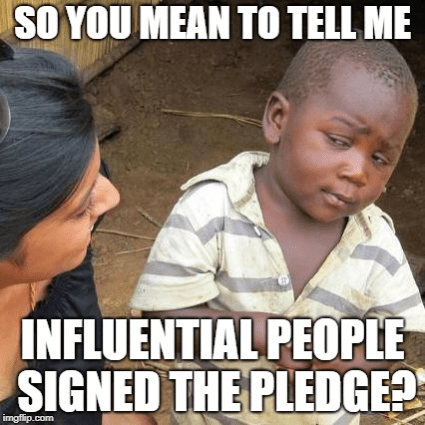
Caption: Photo of surprised boy. (Credit: Ben White on Unsplash)
Celebrating politicians who are bucking the post-truth trend and winning.
This year, many of us watched with pride as Beto O’Rourke, a Pro-Truth Pledge taker, nearly upset Ted Cruz in a race previously considered safe for Cruz. However, the Pro-Truth movement is much bigger than this one notable race. By our count, there are 78 Pledge takers who won elections in 2018!
Let’s take a moment to celebrate all of the successful politicians who are willing to go on record as supporting the Pro-Truth Pledge and commit themselves to the accountability that entails.
Click on this link to view a spreadsheet (sorted by state) listing these political winners.
Has the Pro-Truth Pledge helped these candidates, or is it just that great candidates are the kind of people who don’t hesitate to embrace the truth? We’d all like to think that the Pro-Truth Pledge helps, but having taken the pledge ourselves, we’ve got to be careful about making unfounded claims, so let’s think about this together…
During the O’Rourke/Cruz race, several newspapers took the time to publish editorials mocking O’Rourke for taking the Pro-Truth Pledge. That alone demonstrates that people involved in the media and politics are beginning to notice the Pro-Truth Pledge and it creates added publicity for candidates.
There’s a marketing adage that all publicity is good publicity… However, is honoring truth actually a popular position with typical constituents? The mocking editorials indicate that several right-leaning Texas newspaper editors thought otherwise. Backing their opinion, an NBC news survey found that within the significant (22%) group of Republicans who think the President regularly lies, 56% still approve of him.
So within the GOP, acknowledged lying is not a barrier to political success. Among Democrats, it is clear that of the 94% who believe the president lies, none approve of him. However, there is no clear evidence that lying is the primary cause of the low approval in that group.
Bottom line: Truth isn’t a clear winner on the right, and we can’t legitimately claim to know it is important for the left. This may seem disappointing, but there is no need for our organization to exist if there is no need to change attitudes. This is our motivation.
The important takeaway from polls like this is that they underscore the need to reach out to our friends, particularly those on the right. Make connections, find common ground, and celebrate truth in the places where it matters most.











